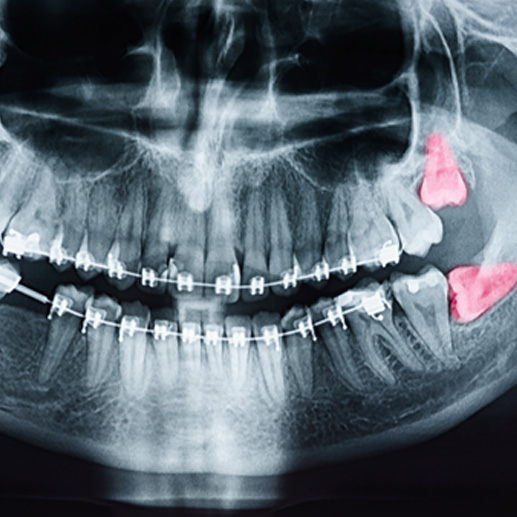Wisdom Tooth Extractions – Springdale, AR
Safely Remove Your Unneeded Wisdom Teeth

Your mouth doesn’t need wisdom teeth to accomplish everyday tasks like biting and chewing. So, if your wisdom teeth start to cause pain or other problems, we highly recommend scheduling an appointment with Dr. Bollin to see if they need to be removed in the near future.
We’ll make sure that you’re well-informed about your oral health needs, and if wisdom tooth extractions at our Springdale dental office are needed, we’ll take the necessary steps to keep you comfortable throughout the removal process.
Why Choose Sunset Avenue Dental for Wisdom Tooth Extractions?
- Same-Day Emergency Appointments
- Caring Dental Team That Explains Your Options
- Efficient Dentist That Doesn’t Waste Time
What Are Wisdom Teeth?

Wisdom teeth are the third and final set of molars that usually appear between the ages of 17 and 25. While they once served an important role in helping our ancestors chew tough foods like nuts and seeds, modern diets and smaller jaw sizes often make them unnecessary.
For many people, there simply isn’t enough room in the mouth for wisdom teeth to grow in properly. This is why at Sunset Avenue Dental, we monitor the development of our patients’ wisdom teeth to determine whether they can stay or need to be removed.
Why Do Wisdom Teeth Need to Be Removed?

Not everyone needs to have their wisdom teeth taken out. The procedure is only considered necessary when:
- The tooth completely fails to break through your gums.
- The wisdom tooth only partially breaks through the gums.
- Your tooth grows in a way that damages neighboring teeth or gums.
- Your wisdom teeth are hard to clean, which increases your risk for cavities and gum disease.
- The problem tooth is causing you recurring discomfort or sudden, sharp pain.
What to Expect From the Wisdom Teeth Procedure

When you're in one of our chairs, your comfort and safety are our top priorities. Before beginning any extraction, we’ll use local anesthesia (and nitrous oxide sedation if needed) to keep you relaxed and pain-free.
Dr. Bollin will carefully make a small incision in your gums (if necessary) to access the tooth, then remove it in one piece or in sections for easier extraction. Once the tooth is removed, the area is cleaned, and the incision is closed with dissolvable stitches. Our team will then provide detailed aftercare instructions to help you heal, so you can get back to regular activities as soon as possible.
Recovering from Wisdom Teeth Extraction

It usually takes about three to four days for your mouth to feel comfortable again after wisdom tooth extraction, although your gums will likely need at least two weeks to fully heal. We’ll give you some aftercare instructions following your extraction, which will likely include:
- Resting as much as possible for the first few days.
- Using a cold compress to reduce swelling.
- Keeping the surgical sites clean.
- Avoiding actions that can dislodge a blood clot, such as swishing vigorously.
- Eating a diet of soft and liquid foods.
Unless your job involves heavy lifting or physical labor, you can typically expect to be able to go back to work or school about two to three days after wisdom teeth extraction.
Understanding the Cost of Wisdom Tooth Extractions

Wisdom teeth can cause all kinds of issues from crowding to extreme pain if they don’t erupt properly. That said, many patients worry more about the cost of wisdom tooth extractions than the issues they may face down the road. While prices can vary, our team will make sure you know what to expect before treatment begins. Our goal is to keep the process as comfortable, predictable, and affordable as possible so you can focus on healing instead of your budget.
Factors That Can Impact the Cost of Wisdom Tooth Extractions

Several considerations go into deciding the final cost of wisdom tooth removal. Common factors include:
- Number of Teeth Removed: Each extracted tooth is billed separately, so removing one tooth is less costly than extracting all four.
- Complexity of the Procedure: Impacted or angled teeth may require surgical techniques to remove them safely, especially if they’re impacted in your jawbone. These additional complications raise the price for each affected extraction.
- Type of Anesthesia or Sedation Used: Local anesthesia is standard, but we also offer nitrous oxide sedation, which will increase the cost.
- Follow-up Care: Prescriptions, aftercare visits, or treatment for complications may add to the total.
Before your treatment begins, we’ll provide a transparent estimate of all associated costs, so there are no surprises. By explaining each cost factor clearly, our team hopes to ensure you feel informed and confident in your decision going forward.
Does Dental Insurance Cover Wisdom Tooth Extractions?

Many dental insurance plans help reduce the cost of wisdom tooth removal, but it all comes down to what plan you’re on. At our Springdale practice, we work with most PPO plans and are in-network with dozens of providers, making it easier for you to maximize your benefits.
Coverage may depend on whether the extraction is considered medically necessary, but our experienced team will confirm eligibility, file claims, and explain your expected out-of-pocket costs before scheduling treatment.
Other Options for Making Wisdom Tooth Extractions Affordable

For patients without insurance, or those needing extra flexibility, we offer convenient options to help make your care more accessible, such as:
- CareCredit: This financing program allows you to pay for your care upfront with a credit card-like structure, allowing you to pay over time.
- In-house Membership Plan: If you don’t have insurance, but would like to have similar benefits, our membership plan helps cover essential care with one low annual fee.
These choices make it easier to access quality care with Dr. Bollin while keeping your budget in mind.
Wisdom Tooth Extractions FAQs
Why Do Humans Have Wisdom Teeth?
While it might seem strange that most people are born with four teeth that usually require removal for medical reasons, the wisdom teeth played a crucial role in the digestive processes of our ancient ancestors. Before the development of cooking, humans lived on a coarse diet of raw plant and animal matter, so they needed extra chewing power to pulverize their food into a pulp that could be easily swallowed and digested. However, the jawbones of modern humans are often too small to accommodate these large third molars, so they can cause a host of uncomfortable oral health problems when they emerge in a person’s late teens or early twenties. Today, it is often necessary to remove the wisdom teeth to prevent issues like dental misalignments, oral infections, and chronic pain. Interestingly, some research suggests that feeding a child a tougher diet early in life can stimulate jaw growth and make it less likely for them to need wisdom tooth extractions when they are older.
Why Are the Third Molars Called Wisdom Teeth?
It might seem strange to think of teeth that tend to emerge at odd angles and cause oral health problems as wise. The third molars are the last teeth a person will receive as they develop, so they represent a sort of milestone in their coming of age. As the old adage goes, “With age comes wisdom,” so the third molars are often referred to as wisdom teeth.
Does Everyone Have Wisdom Teeth?
Most people are born with all four wisdom teeth, but some are born with fewer than that or none at all. Recent research suggests that somewhere between 5% and 37% of the population has fewer than four wisdom teeth, and this may be due to genetic factors. However, you may still have wisdom teeth if they do not erupt from the gum tissue, and the team at Sunset Avenue Dental will be able to detect hidden third molars with x-rays. While most people’s wisdom teeth will emerge when they are between the ages of seventeen and twenty-one, some will receive them sooner or later than that.
How Long Does Wisdom Tooth Surgery Take?
You will most likely be sedated when having your wisdom teeth removed, and this will probably make it seem like no time passes at all between the beginning and end of the procedure. Wisdom tooth extractions usually take between fifteen and twenty minutes per tooth, so removing all four may take up to ninety minutes. However, the process may be more complicated depending on where the wisdom teeth are located and how they are angled, so some extractions may take more time. Our dentist in Springdale will be happy to provide you with an estimate of how long your wisdom tooth extractions will take during your consultation.
